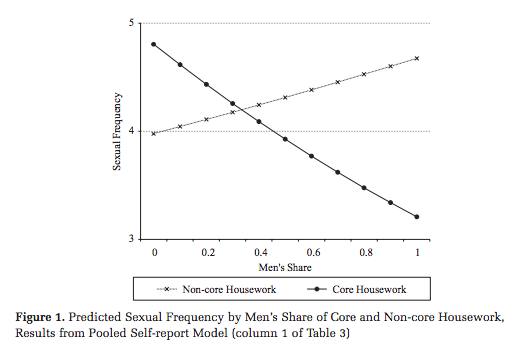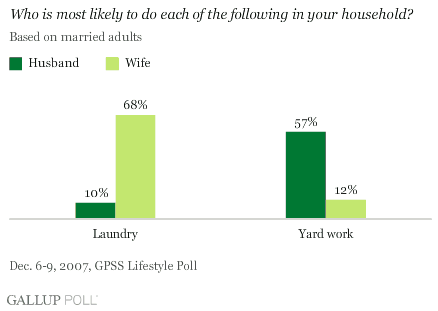Why does an equal marriage mean less sex?
Is marriage about specialization?

A free daily email with the biggest news stories of the day – and the best features from TheWeek.com
You are now subscribed
Your newsletter sign-up was successful
The New York Times recently highlighted some mildly interesting research showing that sexual frequency — measured in times per month — in heterosexual marriages rises when the man does non-core housework (things like car repairs, gardening, or home repairs), and decreases when he does core housework (things like vacuuming, grocery shopping, cleaning, and laundry):

In other words, traditional gender roles made for more nookie within heterosexual marriages. Why? That question hasn't really been answered yet. The answer may be hormonal — for example, men with more testosterone have higher sex drives, and perhaps less aptitude for core housework. Or it might be organizational — a wider division of labor in household activities may lead to couples getting along better. If we think of marriage as an economic arrangement between two people allowing both to specialize more at what they are best at, then that might make sense.
The Week
Escape your echo chamber. Get the facts behind the news, plus analysis from multiple perspectives.

Sign up for The Week's Free Newsletters
From our morning news briefing to a weekly Good News Newsletter, get the best of The Week delivered directly to your inbox.
From our morning news briefing to a weekly Good News Newsletter, get the best of The Week delivered directly to your inbox.
But the correlation may also be a result of problems with the study — the frequency of sex was self-reported (which means participants in the study could have given misleading information), and the study used data from over 20 years ago, meaning that social norms and patterns of behavior may have changed in the meantime. The fact the study didn't control for sexual satisfaction doesn't help, either, because we don't know if more sex meant better or worse sex for study participants.
And on the other hand (as Frances Woolley argues) the differences in monthly sexual appetite between couples that do and don't share housework aren't actually that huge. Both "three times a month" and "four times a month" are a lot more than "zero times a month" or "zero times a year," which is the amount a sizeable number of divorcees and single people are doing it. So if sharing core housework is the cost of keeping a marriage together, then that would lead to more sex, not less.
Essentially, the study and the response to it ask more questions than they answer. How has the relationship between chores and sex changed in the 20 years since the study took place? Does more sex mean more sexual satisfaction? Can a failure to share core housework lead to divorce, as Woolley suggests? Is love an evolutionary mechanism to create a beneficial division of labor?
Future research can, I hope, answer some of these questions. But in the meantime, what we do know is that for a large majority of Americans, traditional gender roles within marriage remain the norm:
A free daily email with the biggest news stories of the day – and the best features from TheWeek.com

John Aziz is the economics and business correspondent at TheWeek.com. He is also an associate editor at Pieria.co.uk. Previously his work has appeared on Business Insider, Zero Hedge, and Noahpinion.
-
 The ‘ravenous’ demand for Cornish minerals
The ‘ravenous’ demand for Cornish mineralsUnder the Radar Growing need for critical minerals to power tech has intensified ‘appetite’ for lithium, which could be a ‘huge boon’ for local economy
-
 Why are election experts taking Trump’s midterm threats seriously?
Why are election experts taking Trump’s midterm threats seriously?IN THE SPOTLIGHT As the president muses about polling place deployments and a centralized electoral system aimed at one-party control, lawmakers are taking this administration at its word
-
 ‘Restaurateurs have become millionaires’
‘Restaurateurs have become millionaires’Instant Opinion Opinion, comment and editorials of the day